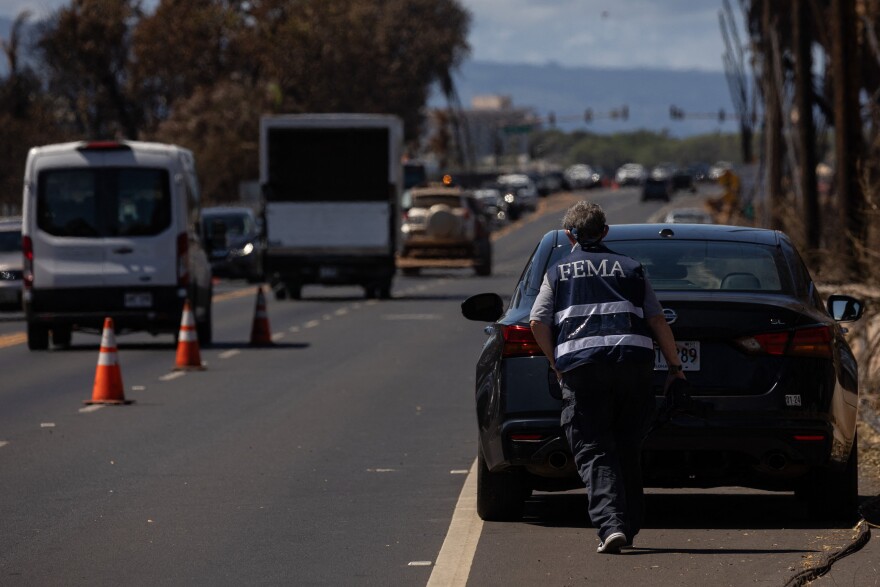After the wildfires in Lahaina on the Hawaiian island of Maui last month, unsubstantiated rumors and conspiracy theories spread nearly as fast as the flames had. There was the one about the government — in some versions it was the U.S., in others a foreign government — using energy beam weapons to start the fire. Others blamed Oprah, the wealthy media mogul, and falsely claimed she was makinga land grab. Still others claimed the fires were a cover-up for military malfeasance.
Lahaina residents told NPR reporters on the ground that the rumors were spreading fear and confusion at a vulnerable time. On a visit to Danilo Andres' home in the burn zone — miraculously standing after the fires — Andres says there was talk that the homes left standing might be further targeted: "There's a satellite in the sky, they just pinpoint the house," he said, explaining the theory. "The rumor's in the hotel right now, so everybody's moving out."
Andres said he didn't find the rumors credible, "... but I don't know. What do you guys know?" he asked reporters.
In the absence of clear, reliable information, the rumors grew and cast suspicion on emergency response efforts. They fed into people's fears that they wouldn't be able to keep their land or their homes, if they remained, leading some to return to houses in the burn zone, days after the fire — despite warnings from authorities that the air and water may not be safe, and the structures may be compromised.

The rumors sowed discord in the tight-knit community. Longtime Lahaina resident Chris Arnold said his kids were scared of a military takeover based on rumors they had heard online. "The stupid sh** you put out there, these kids believe it," he says, speaking directly to those creating and spreading rumors from afar. "Grow up, put your g****** phones down, write a check and help us out, or grow a garden — do something proactive instead of making up sh**."
As communities have to grapple with natural disasters and extreme weather in increasing frequency because of man-made climate change, researchers warn that rumors arising each time in their wake are a force to contend with on their own. While chaos and confusion are common in the wake of disasters, what happened on Maui opens an anecdotal window into the impact of such rumors.
Conspiracy theories grow on social media, with Russia and China in the fray
While people sheltered in hotels on Maui told each other stories and tried to make sense of the changes to their lives, those monitoring online rumors noticed narratives cropping up across social media platforms big and small.
Welton Chang, CEO and co-founder of tech firm Pyrra Technologies, looked at posts on smaller platforms like Truth Social and Gab and saw a lot of unfounded narratives that tap into typical conspiracy themes. "These fires were not natural. They were created by a shadowy cabal of the government and the World Economic Forum and then some celebrities," says Chang, listing some of the theories.
On the larger social media platforms including X (formerly Twitter) and TikTok, Kyle Van Fleet, communications associate at voting rights organization APIAVote, started noticing "a very big response in a conspiratorial way" — through videos meant to debunk those conspiracies, posted by Asian American and Pacific Islander activists and influencers shortly after news of the fire broke.

Among the themes Van Fleet saw were climate denial claims, asserting that the fire had nothing to do with climate change. But he also noticed other kinds of messages spreading.
"There was ... a niche narrative that this was the beginning of turning Maui into a smart city," Van Fleet says, referring to a conspiracy theory that claims efforts intended to reduce traffic and increase walkability are actually a plot by governments to use climate change as a pretext to turn cities into "open air prisons."
Conspiratorial narratives like these once stayed confined to smaller, fringe social media sites a while before they spread to larger platforms. Now, they rapidly gain an audience on platforms like X — renamed from Twitter — after Elon Musk took over and most of its staff working on content moderation left or were laid off.
Foreign actors also quickly jumped into the mix. Russian state propaganda amplified home-grown criticisms of the disaster response like those of former U.S. Rep. Ron Paul, R-Texas, who argued that "Ukraine matters to Biden more than Hawaii."
Accounts that were part of influence operations tied to the Chinese government spread the false narrative that a meteorological weapon was responsible for the fire, researchers from four separate organizations — Recorded Future, Microsoft, NewsGuard and the University of Maryland — found.
The online blitz of falsehoods about the fire has mostly died down, though the more conspiratorial narratives continue to linger on the fringe, Van Fleet says.
Researchers who regularly track rumors during disasters say that the theories emerging online about Maui aren't surprising. Tara Kirk Sell, an associate professor at John Hopkins Center for Health Security, has tracked rumors emerging from public health emergencies dating back to the Ebola outbreak in 2017.
"The thing that we learned was it wasn't really about Ebola," Sell says. "The topic of Ebola is a vehicle for all these other social, political or financial goals."
During a recent hearing, U.S. Sen. Mazie Hirono, D-Hawaii, blamed Russia and China for spreading disinformation to discourage residents from seeking help from the federal government and to paint the federal response in a negative light. But in a sign of how well those narratives can take hold in a polarized political environment, U.S. Rep. Russell Fry, R-S.C., amplified baseless allegations of a government cover-up of the fires on the far-right outlet Newsmax.
Still, researchers say domestic actors remain the bigger worry. The Chinese influence operation was quite small, according to NewsGuard. Researchers at Recorded Future wrote that "engagement with Russian state-funded media sources is almost certainly less prevalent than organic engagement with US domestic media or prominent social media personalities."

Rumor response is part of disaster response
Since the 1990s, the Federal Emergency Management Agency has listed rumor monitoring control as part of emergency response and now hosts a web page addressing some of those rumors specific to the Maui fire. One of them is, "If I apply for disaster assistance, FEMA may confiscate my property or land if they deem it unlivable."
"FEMA cannot seize your property or land. Applying for disaster assistance does not grant FEMA or the federal government authority or ownership of your property or land," the web page states.
FEMA, whose own personnel became subjectto rumorsrelated to the fire, declined NPR's request for an interview but pointed people toward local community leaders and emergency managers for accurate disaster-related information.
It's difficult to tease out how rumors in the online and offline worlds cross-pollinate and to quantify how much rumors affect behavior, though there are documented effects.
At the height of the COVID pandemic, as false narratives around new vaccines swirled, surveys showed that false narratives deterred some people from getting shots. In the aftermath of Hurricane Harvey in 2017, researchers tracked how rumors such as "immigration status is checked at shelters" gained traction on social media, as reporters on the ground noted how undocumented immigrants who were already fearful of immigration enforcement activities hesitated to go to shelters or to ask for federal assistance.
Rumors that have staying power often contain kernels of truth. Hawaii was forcibly colonized by the U.S. in the 19th century — a history the U.S. government officially apologized for in the 1990s. Lahaina, which was ravaged by the fires, was once the capital of the Hawaiian Kingdom. Prior to the fires, it was considered prime real estate, and longtime residents have long been anxious about real estate development. Today, Native Hawaiians are still waging legal battles to reclaim their water rights and ancestral land.
Residents have also expressed frustrations with the federal response, describing it as late, disorganized and culturally flat-footed, sometimes getting in the way of local community efforts that filled early support gaps.
Sell says it's important for the government to lean on trusted messengers in disaster situations when the government itself isn't trusted, but better communication is only one part of the solution. "It's not just [saying], 'You must trust us.' It's ... showing that you're trustworthy."
"I think that we should, for pretty much every disaster in the future, be expecting to see these types of rumors," Sell says.
Marisa Peñaloza and Jonaki Mehta contributed reporting to this story contributed to this story
Copyright 2024 NPR. To see more, visit https://www.npr.org.





